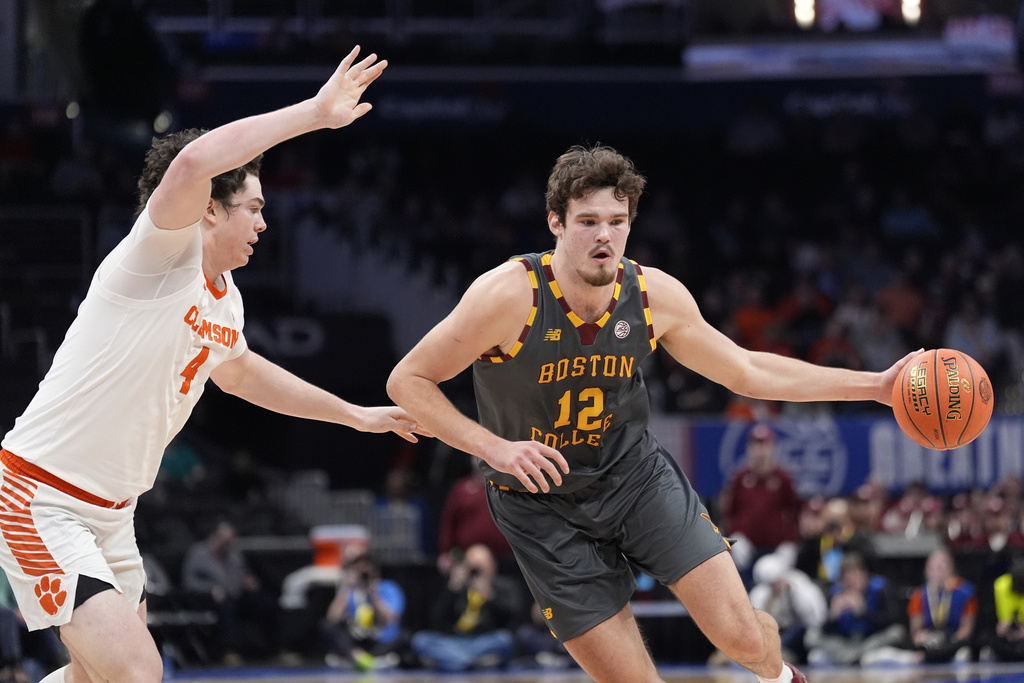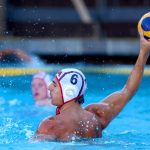Quinten Post was in Puerto Rico with his girlfriend last week when he got the call from the Warriors that they were selecting him with the 52nd pick in the NBA Draft.
Back home in Amsterdam, Post’s parents cried tears of joy. Elsewhere in the city, a group of 30-40 of the best hoopers in the Netherlands stayed up until 2 a.m. local time — watching with their fingers crossed — and cheered when Post’s name was announced.
“It was like all of us achieved something,” Jard Schuit, Post’s longtime trainer and draft watch party host, told this news organization.
“It was really emotional because we haven’t had any players drafted in years and years, and it felt so far away. It feels like miles and miles away for a lot of kids here. But now it feels like it’s in reach. It inspires a lot of kids behind Quinten.”
Post became the first Dutchman drafted to the NBA since Henk Norel in 2009. The last to play in the league were Dan Gadzuric and Francisco Elson in 2012. Besides Rik Smits, the history of the NBA in the Netherlands is sparse, and the country has been in a decade-plus drought.
Post knows the history.
“Just for some of these kids to see that it’s possible, that a Dutch player — born and raised in the Netherlands — that it’s possible to get to the NBA level, hopefully it’s inspirational,” Post, 24, told this news organization.
Right after the NBA Draft ended, Schuit’s phone kept buzzing with more good news from other players he has trained. Jesse Edwards signed a two-way deal with Minnesota. Malevy Leons signed an Exhibit 10 contract with the Thunder, and Tristan Enaruma did the same with the Celtics.
They all trained together with Schuit growing up in the Netherlands, the land of the Red Light District, Heineken, Phillips, canals, bikes and tulips. And, maybe one day, of basketball.
If Post can break into the league, with the Warriors or otherwise, he could lead the charge for a new generation of Dutch ballers.
“We are the tallest people of the world,” Post said (fact check: true). “But basketball just hasn’t really exploded as it has in some of the other places. The four of us, we hope it creates a wave throughout our country. Personally, I’m very proud to be able to represent the Netherlands.”
Growing up in the Netherlands, Post would tag along to watch his dad’s late-night basketball games and practices, but didn’t start playing until 11. Like most of the Netherlands, soccer was his thing. None of his friends played basketball so he took it upon himself to commit to the game.
Around age 14, he met Schuit, the trainer Post describes as the “central hub” for elite basketball in the Netherlands. A few years later, after a growth spurt, he started working with him and his All Day Basketball program.
Schuit guided Post into a competitive environment with the other top young players in the country. Even though Post was relatively new to basketball, he held his own.
“He can hang with those guys, it was like a little flame that went off inside of him,” Schuit said. “He started to slowly see that this could be something for him. He was taller than everybody else, but he was very mobile, great touch, very coordinated for his size. He was very skinny, very slim, but he could move well for someone so tall.”
Post dedicated himself to extra training sessions with Schuit. He tested himself against bigger, stronger and older professionals from the area. He spent some time in Germany, where he put on muscle.
Despite offers from pro teams in Spain and Serbia, Post chose to go to the States for college, prioritizing education. He was rewarded by riding the bench for two years at Mississippi State.
“Our culture is very different in many, many ways,” Schuit said. “The competitive level of sports (in the U.S.), there’s a certain tenacity, certain aggression. Dutch people are more laid-back I’d say, more social in their approach. So when they go to the States for the first time, they get knocked down by a wall.”
But even as he struggled to find the court for the Bulldogs, talent evaluators noticed Post’s tools. He chose Boston College from about 20 offers in the transfer portal, Schuit said, committing during the pandemic shutdown in 2021 via Zoom call.
Earl Grant, then the new BC head coach, gave Post the green light from 3-point land he lacked at Mississippi State. Shooting technique tweaks back home with Pruit made the autonomy look genius. Post rediscovered his stroke and got more physical around the basket by bulking up from 220 to 245 pounds, Grant said.
Boston College forward Quinten Post (12) goes up against forward Jordan Minor (22) during the second half of an NCAA college basketball game in the quarterfinal round of the Atlantic Coast Conference tournament Thursday, March 14, 2024, in Washington. (AP Photo/Alex Brandon)
“At Boston College, I think they really unlocked something with him, something I saw when he was 14,” Schuit said.
Post improved daily and became more skilled than Grant even imagined. Against full-court presses, the Eagles trusted the 7-footer to handle the ball.
As a senior at BC, Post averaged 15.1 points, 5.6 rebounds and 0.9 blocks per game and was named the Atlantic Coast Conference Most Improved Player of the Year. He was even better the next season as a fifth-year player, registering 17.0 points, 8.1 rebounds and 1.7 blocks per game. Both seasons, he shot over 40% from behind the arc as an inside-out threat.
“Can shoot the ball, stretch the floor,” Warriors general manager Mike Dunleavy Jr. said of Post. “He’s got really good size. But more importantly, you want players who can do more than one thing. We think he rebounds, we think he can defend at a level at the rim that’s NBA-acceptable. Good passer. So, he fits a lot of things we look for.”
It’s no coincidence that Post first picked up the sport the same year Dirk Nowitzki led the Mavericks to the NBA championship over the Miami Heat. The smooth-shooting German forward was Post’s first NBA idol as a multifaceted big man.
“Nowadays, you have to be able to shoot the ball, dribble the ball, pass the ball,” Post said. “Guys who have been able to do that have always been fascinating to me.”
Off the court, Post became more comfortable with his surroundings in the Boston area. He was jovial with his teammates and flashed a sense of humor — “he’s kind of a free-spirited guy,” Grant said.
Post was always a smart player, but things slowed down even more for him with the Eagles. He became a voice on the sideline.
Related Articles
Kurtenbach: It’s Lauri Markkanen or bust for the Warriors
Warriors to hire pair of veteran coaches to bench
Warriors agree to sign-and-trade for veteran Kyle Anderson: reports
What Steph Curry says about Klay Thompson’s departure from Warriors
Klay Thompson’s defection to Dallas adds to storied Bay Area pipeline
“He really helped me and the staff with his IQ,” Grant said. “… Sometimes in our huddles, I’d allow (Post) to talk and coach a little bit. And the solutions he’d come up with were so well thought-out and so smart, I’d change what we were doing and say, ‘Let’s do that.’”
If Post pans out with the Warriors, it’ll be because he’s a late bloomer who continues to improve as the competition level rises — just like Trayce Jackson-Davis did last year as a late second-rounder. It’ll be because the game has changed, from Nowitzki to Brook Lopez to Kristaps Porzingis, to emphasize the advantage perimeter-oriented 7-footers can have. It’ll be because he has the head to quickly integrate into Steve Kerr’s read-and-react system.
That could signal the start of a new chapter for basketball in the Netherlands.
“I was trying to tell people, ‘Hey, these kids are going to be good. NBA-good,’” Schuit said. “Everybody was making fun of me. That was five years ago. I kept the receipts. I know who made fun of me, and who made fun of us. ‘They come from this culture, they’re too lazy, they’re too slow, they’re never going to be good enough.’ I kept the receipts.”
“I feel like it’s going to be piling on from now,” Scuit added. “It’s a very special generation, but also one that opens the door to future success.”


